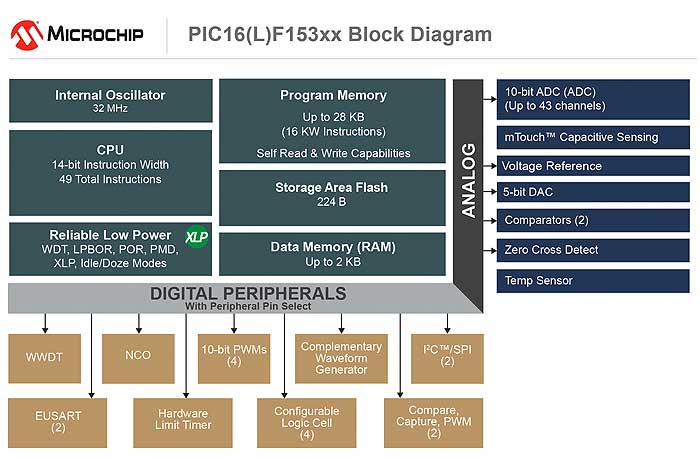 Microchip announces The PIC16F15386 family, the most powerful launching point into the 8-bit PIC® microcontroller (MCU) portfolio. In addition to Microchip’s current Core Independent Peripherals (CIPs), this family includes a high-accuracy 32 MHz internal oscillator and memory features such as Memory Access Partition (MAP) with bootloader-friendly write-protection to prevent accidental over-write. Device Information Area (DIA) offers protected storage for unique device identification and calibration values. The PIC16F15386 family also offers a comprehensive, easy-to-use development experience with Microchip’s MPLAB® Xpress with MPLAB Code Configurator, the quickest way to generate application code. The family is suitable for a broad range of general purpose and low-power applications.
Microchip announces The PIC16F15386 family, the most powerful launching point into the 8-bit PIC® microcontroller (MCU) portfolio. In addition to Microchip’s current Core Independent Peripherals (CIPs), this family includes a high-accuracy 32 MHz internal oscillator and memory features such as Memory Access Partition (MAP) with bootloader-friendly write-protection to prevent accidental over-write. Device Information Area (DIA) offers protected storage for unique device identification and calibration values. The PIC16F15386 family also offers a comprehensive, easy-to-use development experience with Microchip’s MPLAB® Xpress with MPLAB Code Configurator, the quickest way to generate application code. The family is suitable for a broad range of general purpose and low-power applications.
The scalable family offers up to 28KB Flash and 2KB RAM in 8- to 48-pin package options. It is the first 8-bit PIC MCU family to offer the 48-pin package, adding more Analog-to-Digital-Converter (ADC) channels and I/Os. The family offers high levels of CIP integration to perform system functions, such as signal generation, motor control, safety monitoring, system communications, and human interface, outside the core while minimising power consumption. The new MCUs offer IDLE and DOZE modes as well as Peripheral Module Disable power-management features to enable engineers to optimise the balance between power consumption and performance.
The new family-specific Xpress series development board enables projects to start immediately. In only two minutes, engineers may start application code development with the Xpress series board and the cloud-based MPLAB Xpress IDE. The family is also supported by two Curiosity boards (DM164136 and DM164137) and Microchip’s free software development platforms including MPLAB Code Configurator (MCC) and MPLAB X IDE.
Microchip Technology | www.microchip.com/153XXLaunch


